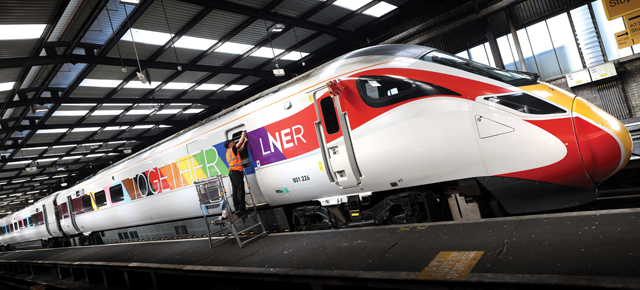East Coast intercity operator LNER was among four TOCs to exceed 2019 patronage levels in the first quarter of 2023, but others are lagging behind

East Coast intercity operators continue to lead the way when it comes to welcoming people back to rail. Between January and March 2023, passenger journeys exceeded pre-Covid numbers at four train operating companies.
LNER, which has topped the table for franchised operators for two years running, carried 111% of the passenger numbers it did during the same period of 2019. Transport UK Group-owned East Midlands Railway also managed to exceed the 2019 figure, carrying 101% of the passengers it did four years ago.
LNER and East Midlands were joined by two non-franchised East Coast operators in exceeding pre-Covid patronage – Hull Trains (122%) and Grand Central (111%).
LNER recorded 6.0 million passenger journeys, an increase of 22% on the same period in 2022. Fridays and Sundays are still proving to be the most popular days for people to travel on its services as demand for leisure journeys continues to thrive. As a result of changing travel trends, LNER is looking to increase capacity on Sundays, with proposals for additional Sunday services on its London King’s Cross and Leeds route. The wider industry is also trialling carrying out essential engineering works during the week to keep customers on the move during the popular weekend period.
We’ve seen a huge demand in leisure travel, with business travel continuing to grow. In the 2022-23 financial year, we carried one million more passengers than we than we did in 2018-19
David Horne, managing director at LNER, commented: “We’ve seen a huge demand in leisure travel, with business travel continuing to grow. In the 2022-23 financial year, we carried one million more passengers than we than we did in 2018-19.”
While LNER and others are bouncing back, some operators continue to lag. 13 of the 20 franchised operators are still missing more than a fifth of their pre-Covid passengers and four train operators are missing more than a third.
TransPennine Express is at the bottom of the table with only 60% of its pre-Covid patronage, although this has been aggravated by widespread service cancellations that saw it taken over by the Department for Transport’s operator of last resort ( OLR ) on May 28. South London commuter TOCs Southeastern and South Western Railway didn’t do much better, carrying 62% and 63% of their pre-Covid patronage respectively.
Passenger journeys by operator, January to March 2023, and as a percentage of January to March 2023
Source: Office of Rail & Road
Franchised TOCs:
LNER (6.0m) 111%
East Midlands Railway (6.6m): 101%
Caledonian Sleeper (0.1m): 96%
London Overground (41.6m): 88%
Merseyrail (6.0m): 85%
Northern Trains (21.0m): 83%
Greater Anglia (16.8m): 80%
Great Western Railway (18.8m): 77%
Govia Thameslink Railway (63.1m): 71%
ScotRail (16.8m): 71%
West Midlands Trains (14.4m): 70%
c2c (8.8m): 69%
Avanti West Coast (6.8m): 69%
CrossCountry (6.9m): 68%
TfW Rail (5.4m): 67%
Chiltern Railways (4.7m): 65%
South Western Railway (34.8m): 63%
Southeastern (29.4m): 62%
TransPennine Express (4.4m): 60%
Elizabeth line: Not presented due to uncertainty overt the data
Non-franchised TOCS:
Hull Trains (0.3m): 122%
Grand Central (0.4m): 111%
Heathrow Express (1.1m): 78%
Lumo (0.3m): n/a
This story appears inside the latest issue of Passenger Transport.
DON’T MISS OUT – GET YOUR COPY! – click here to subscribe!








